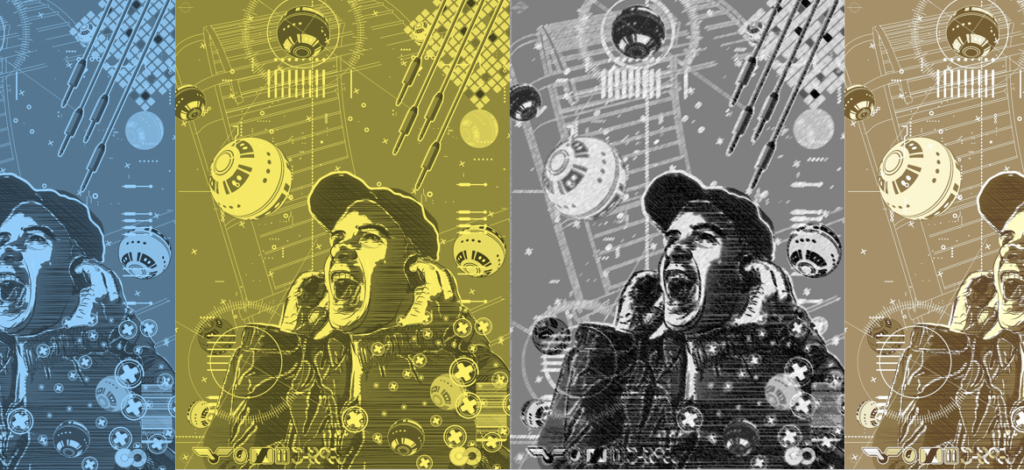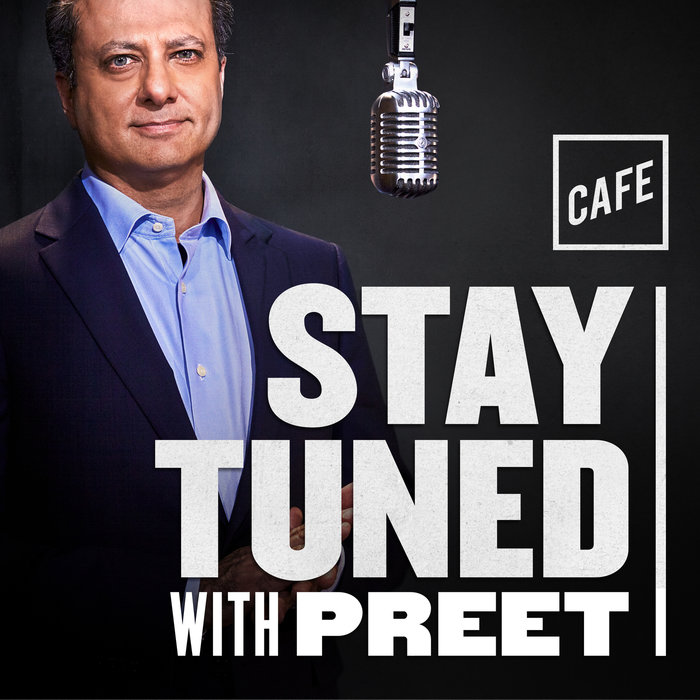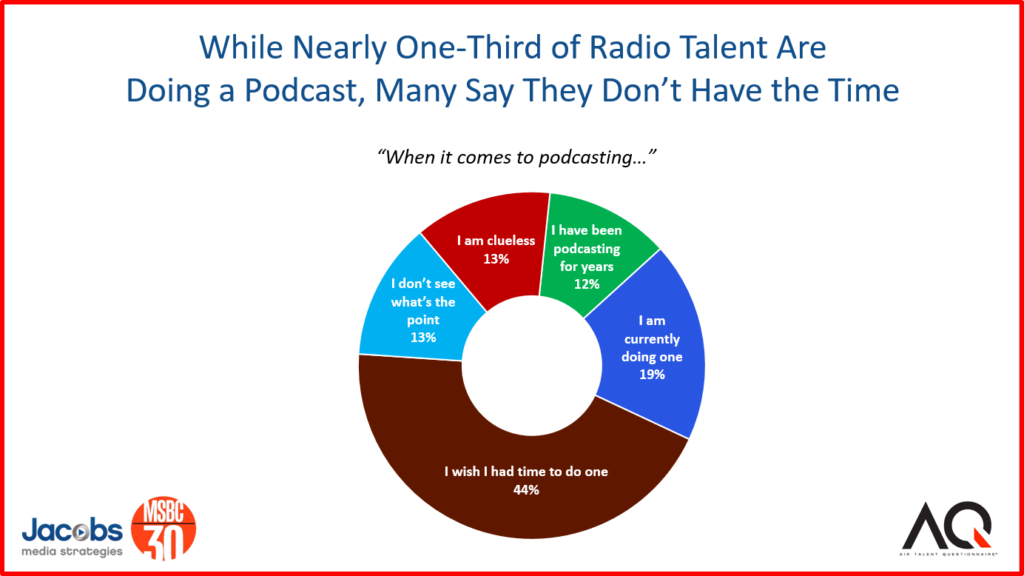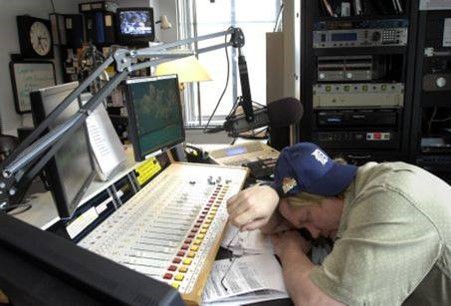
If you’re on the air, and someone ask you what you do for a living, how do you respond?
“I’m the morning show sidekick on 107.1 The Bear?”
“I’m the nighttime jock on Country 99.5.”
“I’m the afternoon news anchor on News/Talk AM 990.”
Chances are, you’re using some kind of daypart designation to describe your position. And if you think about it, there’s a pecking order in radio of the most desirable “shifts,” as well as those that pay the most.
But the media business and its personalities are now facing a striking redefinition. Do you host a morning talk show OR are you a true entertainer or journalist? And why does it matter?
It matters because fans of yours – and/or your station – would likely appreciate the idea of you being a multi-media brand, showing up in different contexts and outlets in their lives. When you create a bona fide fan base, chances are they want to see other sides of you than just your standard role at your station.
That might mean having a social media presence, doing on-camera work for a local TV station, hosting a podcast, creating a video channel, starting a channel on Twitch, or aligning with a charity or community organization. Or it could involve writing a book, organizing a celebrity golf tournament, or starting a blog. The more you can create positive connections with your tribe. the better the likelihood of you being able to transcend just being the night DJ or the morning traffic reporter.
Now, I know what you’re thinking – where am I going to find the time? And in many cases, how do I acquire the expertise in these other disciplines?
I’m not short-changing those barriers or speed bumps. After all, you have a personal life, perhaps a family, and other obligations that go beyond what you do for a living.
That said, we’re seeing more and more indicators that radio and TV personalities are evolving into multi-media brands. That’s precisely what’s happening on MSNBC and to a lesser extent, CNN, and their lineup of hosts – as well as their regular guests. Put your politics aside, and consider how the Trump Era has helped spawn a whole bevy of personalities unknown to us just a few years ago. Clearly, the Trump Era has ushered in a period where TV personalities, in particular, are enjoying broader success. From Sean Hannity to Brian Williams to Judge Jeanine to Chris Cuomo, the networks see huge upsides in grooming their talent for bigger stardom and broader appeal.
To pull that off, talent has to go well beyond their everyday exposure on television or radio. It’s called brand extension, and it requires putting together an aggressive, consistent, strategic communications plan that means you’ll be working overtime – a lot.
Some of the biggest TV personalities are making heavy bets on audio – specifically, podcasts. Consider that not only do Rachel Maddow and Chris Hayes both host evening shows on MSNBC, they are now behind the mic of successful podcasts (Bag Man and Why Is This Happening? respectively). And the network is promoting this on-demand audio programming heavily – on the air, on social media, and on their website.
NBC’s Meet The Press host, Chuck Todd, is in the house with his own podcast, cleverly named the Toddcast. In addition to the Sunday morning classic, Todd hosts a Monday-Friday afternoon show on MSNBC, and now this podcast.
Personality brand extension comes in physical formats, too. The cable news networks are also investing in logoware. The MSNBC Store appears to be the biggest of them all – an online shopping experience that has created multi-levels of logo products for fans of their shows and the talent associated with them. Fox News and other networks are cashing in on brand extension as well (although not as focused on their personalities but more on the “mother ship”).

But it’s not just the main hosts dipping their toes into the podcast waters. Regular expert guests on these shows are also breaking out with their own branded content – yet, another way to reach a different, but critically important audience. Preet Bharara, former U.S. Attorney for the Southern District of New York, was fired by Trump in early 2017.
That fall, he stepped out into two different media outlets, becoming Senior Legal Analyst for CNN, and starting a podcast, Stay Tuned With Preet. (He now has  launched a second podcast.). In addition, Bharara also took the time to write a book, Doing Justice: A Prosecutor’s Thoughts on Crime, Punishment, and the Rule of Law.
launched a second podcast.). In addition, Bharara also took the time to write a book, Doing Justice: A Prosecutor’s Thoughts on Crime, Punishment, and the Rule of Law.
Then there’s Chuck Rosenberg, another legal expert who regularly appears on MSNBC. He’s a former U.S. Attorney, also serving with the FBI. On CNBC, he’s frequently in that zone where the law and government intersect.
Yesterday, he kicked off a new podcast – The Oath – featuring interviews with law enforcement officials like James Comey and Bharara. This is part of a larger NBC News initiative, spearheaded by Steve Lickteig, their executive producer of podcasts and audio (how’s that for a title for a TV network exec?).
It wasn’t long ago when NBC News provided “showcasts” as podcasts – the TV audio from these shows. But now, they’re launching original podcasts, with a plan to produce several before this year is out.
Obviously, this requires a commitment from all those involved – producers, writers, researchers, and of course, the talent themselves. But great personality brands are now built on multi-platforms, requiring even longer hours and a deeper commitment.
We saw some of the barriers in our first AQ survey of North American air talent, conducted last spring in partnership with Don Anthony’s Morning Show Boot Camp. The good news is that nearly one-third of our on-air radio respondents tells us they already produce a podcast, a plurality – 44% – say they “wish they had the time” to produce one.

No judgments here, but Millennials are the generation of talent least likely to use lack of time as their excuse. In fact, well more than a third of them already have a podcast.
The idea that as a radio personality, your presence ends when your show is over is fading fast. Ask any talent agent, and chances are they’ll tell you that having multiple media outlets is not only a form of occupational insurance, but a way to fan out, network, and expose yourself to more consumers beyond broadcast radio.
And as I’ve seen throughout my career as a programmer, researcher, and consultant, what’s good for talent is usually good for their home brand. That’s what Steve Licktieg and other network executives have come to realize. While it may require more staff support, time, and energy, building on the celebrity of his talent is good business for NBC/MSNBC.
All of this requires time, investment, commitment, energy, and staying in good mental and physical shape. But as we’re seeing in the world of sports, politics, film,  television, and other pop culture outlets, a presence on multiple channels isn’t just smart, it’s essential. It is becoming more difficult to think of true stars in these fields who aren’t spreading their energy and influence across platforms.
television, and other pop culture outlets, a presence on multiple channels isn’t just smart, it’s essential. It is becoming more difficult to think of true stars in these fields who aren’t spreading their energy and influence across platforms.
None of this is to suggest the people working on the airwaves in radio are slacking. In fact, most have gotten the memo. My take is that the vast majority of radio talent today are working longer days than their counterparts did back in the 70s and 80s. It’s that kind of world.
And I know that many radio personalities reading this are thinking, “Fred, this is nothing new – I’ve been multi-tasking my career for years.”
And if that’s the case, stop reading and get back to work. But it may also be a fact that the path to stardom and celebrity (assuming that’s the goal) has become more arduous, requiring a true game plan. It takes more to shine today, but the rewards are potentially greater for a larger number of people. Morning show sidekicks, producers, part-timers, and weekenders now have the chance to make a name for themselves on these secondary platforms, positioning themselves for bigger and better things down the road.
Not everyone is capable of writing and producing a podcast. Or hosting videos. Or connecting in the social space.
But if you can make a little time, the opportunity is there for the taking.
You can sleep later.
Thanks to Kevin Matthews for putting up with me using his photo from back in the WLAV days.
AQ2 – radio’s only research study by talent/for talent is coming soon to an email box near you. If you want to be sure you’re included, send an email to [email protected]
- What To Do If Your Radio Station Goes Through A Midlife Crisis - April 25, 2025
- A 2020 Lesson?It Could All Be Gone In A Flash - April 24, 2025
- How AI Can Give Radio Personalities More…PERSONALITY - April 23, 2025




Great opportunities Fred, for “radio talent” to re-think their roles on a much bigger canvas. And re-design their agreements accordingly… We’ve been telling talent to think of themselves as businesses for years; now they can really do it; and define how they play with the “mother ship” and beyond. What deals they can negotiate externally that “shine a light” on all. Radio may not like it, but won’t want to lose talent they’re vested in. It’s now an array of opportunities from all sides… and a lot of major talent on major networks globally have, and are doing just this. Its a win-win… not necessarily a “multi-task” one way mindset.
On board with all of this, Lee. More often than not, what’s good for “talent brands” is good for station brands. Thanks for the comment.
Absolutely right, Lee. There are so many opportunities, and in the end run, what is generally good for talent brands works for their radio stations.